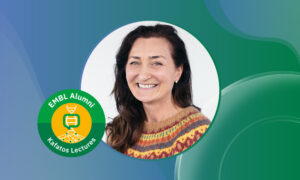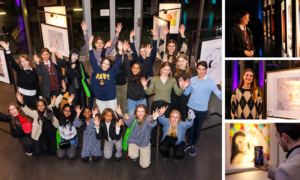
2024 EMBL Alumni Award recipients announced
Two former EMBL scientists have been recognised for their outstanding contributions to research and leadership capabilities in the fields of evolutionary cell biology and molecular medicine

By Tom Furnival-Adams, Alumni Relations Officer
The 2024 EMBL Alumni Award recipients have been selected.
Thibaut Brunet has received the 2024 John Kendrew Young Scientist Award in recognition of his groundbreaking discoveries in the field of evolution of development. His creative and original research has reshaped our understanding of how fundamental morphogenetic mechanisms govern the generation of shape and form in animals during evolution.
Giulio Superti-Furga has been awarded the 2024 Lennart Philipson Award in recognition of his impact as a researcher which is multiplied through the leaders in science and beyond whom he has trained, the companies he has created, and the tools and methods he has shared with the life sciences community throughout his ongoing exceptional career. His contributions in basic science have endorsed the translation of basic research findings towards novel therapies, and in doing so he has helped support and develop the next generation of translational scientists. Through his leadership, he has encouraged scientists to take on responsibility in research management and other sectors of society.
The Alumni Awards will be presented during a two-day Scientific Symposium, ‘From atoms to ecosystems – a new era in life sciences’, on 4-5 July 2024, marking EMBL’s 50th anniversary. The celebrations will be held both virtually and in person at EMBL Heidelberg and registration is free and open to all EMBL staff and alumni.
After studying biology at the Ecole Normale Supérieure in Paris, Thibaut Brunet did his PhD in the Arendt Group at EMBL Heidelberg from 2011 to 2016, where he studied the development and evolution of muscle cells.
After completing his postdoc at UC Berkeley, where he focused on morphogenesis and cell contractility in choanoflagellates, one of the closest and typically unicellular relatives of animals, he joined the Department of Cell Biology and Infection at the Institut Pasteur in Paris as a group leader.
Brunet’s research has clarified how actomyosin contractility shapes choanoflagellate colonies. This work began with the discovery of an altogether new species of choanoflagellate in the Caribbean Sea. Brunet demonstrated that a mechanism commonly seen in animals for shaping structures also functions in these simple multicellular protists. However, in choanoflagellates, it operates with distinct regulatory mechanisms and serves different purposes.
“This and other discoveries that Thibaut made represent the best of the synthesis between evolutionary and developmental biology and will without any doubt shed new light on the fascinating question of where animals and we as humans come from,” said Pavel Tomancak, Chair, EMBL Alumni Association Board.
Brunet said: “EMBL is the place I was born as a researcher, and remains one of the places I’m watching the most closely for exciting scientific developments – with the current scientific program ‘Molecules to Ecosystems’ feeling especially close to my heart.
“I feel that one remains a lifelong member of the EMBL diaspora and that one carries everywhere with oneself a special connection to the place and to its community, as well as to its spirit of boldness, creativity, rigour, and generosity. It is thus a special honour to receive this award, which I dedicate to all the colleagues who have trained and inspired me, at EMBL and elsewhere.”
Giulio Superti-Furga was a postdoc and then team leader in the Developmental Biology Unit at EMBL Heidelberg from 1991 to 2004. He is currently the Scientific Director and Research Group Leader at the Research Centre for Molecular Medicine (CeMM) in Vienna, which he has led since its founding in 2005. Superti-Furga is also Professor of Medical Systems Biology at the Medical University of Vienna and Scientific Director of Ri.MED Foundation Palermo.
Superti-Furga co-founded the biotech companies Cellzome, Haplogen, Allcyte (now acquired by Exscientia), Proxygen, and Solgate. In 2017, Superti-Furga was awarded the title of Commander of the Order of Merit of the Italian Republic in recognition of the impact of his leadership and scientific achievements and in 2024 he received the Austrian Cross of Honour for Science and Art, First Class, presented by the President of the Republic of Austria.
His major accomplishments include the elucidation of basic regulatory mechanisms of tyrosine kinases in human cancers, the discovery of fundamental organisation principles of the proteome and metabolome of higher organisms, and the development of integrated approaches to understanding the mechanism of drug action at the molecular level.
In short, through his work and endeavours, Superti-Furga has created a significant scientific, societal, cultural, and economic impact.
Superti-Furga said: “When I came to EMBL in 1991, I met Lennart Philipson, a true mentor who would share advice over walks, pipe in hand. EMBL, for me, has been a beacon of inspiration and support. This spirit has driven my work in community building and translational research at Cellzome, CeMM, startups in Vienna, and with EU-LIFE. It’s the backbone of my future projects in Sicily. The joy of discovery and the commitment to making a real impact in precision medicine are legacies of my EMBL experience.”
Nominations and applications for the 2025 John Kendrew and Lennart Philipson Awards and the 2026 Kafatos Lecture are now open. Please click here to find out more and submit a nomination or application.


